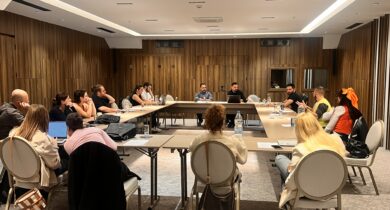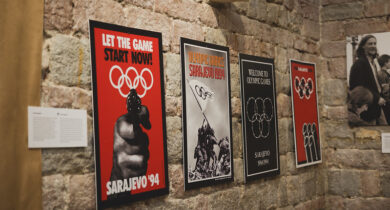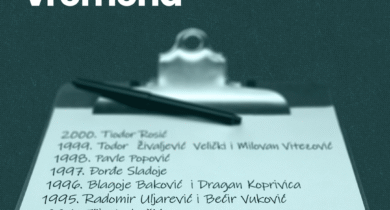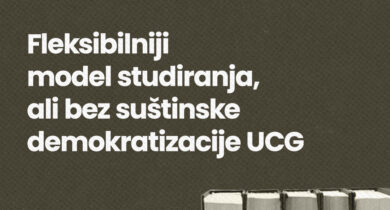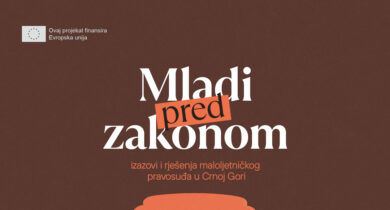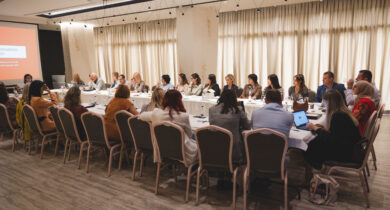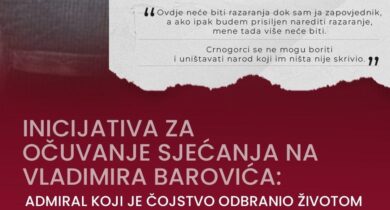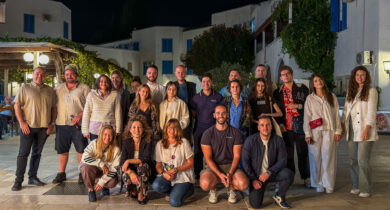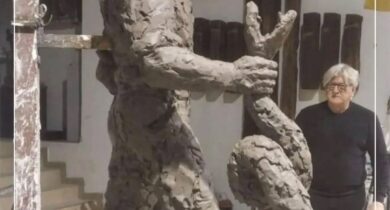Although the Western Balkan countries are formally moving toward European integration, the legacy of the 1990s still shapes their public sphere. Without multiperspective approach to history teaching that develops critical thinking, there can be no genuine dealing with the past or reconciliation. Projects such as the Joint History Textbooks have shown that agreement is possible,… »
Actual
Solidarity and Cooperation Strengthen the Position of LGBTQI+ Persons in the Region
“Exchanging experiences and establishing direct contact led to new collaborations, actions, and ideas,” was the message from the two-day meeting of civil society organizations from Montenegro, Albania, Bosnia and Herzegovina, Kosovo, North Macedonia, and Serbia, whose projects are supported through the Together for LGBTQI+ Equality programme. It is implemented by the Centre for Civic Education… »
Exhibition “The 1990s: From Dissent to Resistance” Opens in Cetinje on 6 October
Centre for Civic Education (CCE), M90 Foundation, and Cultural Front from Serbia, in cooperation with the Cultural Centre of the Old Royal Capital Cetinje, will open the exhibition “The 1990s: From Dissent to Resistance” on Monday, 6 October 2025, at noon, at the Gallery of the Cultural Centre (Dvorski trg 1). This exhibition recalls often… »
An Important Decision Against Revisionism and the Glorification of War Criminals
Non-governmental organizations and civic activists welcome the decision of the Municipal Assembly of Bijelo Polje to revoke the “Risto Ratković” award from convicted war criminal Radovan Karadžić. Today’s vote in the Municipal Assembly of Bijelo Polje is significant because, after 32 years, Bijelo Polje and the “Ratković Poetry Evenings” have corrected a long-standing injustice that… »
A more flexible study model, but without essential democratization of University of Montenegro
Centre for Civic Education (CCE) welcomes the fact that the Ministry of education, science and innovation has taken into account part of CCE’s comments and suggestions on the Draft Law on Higher Education from November 2024, but also points out that there is room for amendments to ensure that the final text is of high… »
Number of Juveniles Reported for Criminal Offenses on the Rise – Institutions Must Strengthen Prevention and Resocialization
Montenegro stands at a crossroads between declarative commitment and the real need for reforms that would ensure consistent and humane application of the Law on Juvenile Justice in Criminal Proceedings. Therefore, the future development of juvenile justice must be directed towards building functional and specialized institutions, continuous training of professional staff, expanding the use of… »
Civic education – an investment in responsible citizens
The introduction of civic education as a mandatory subject in all schools provides young people with the opportunity to acquire knowledge, skills, and values that enable them to participate actively, responsibly, and democratically in their communities, was the key message from the workshop organized today in Podgorica by the Centre for Civic Education (CCE), in… »
Initiative to Preserve the Memory of Vladimir Barović: The Admiral Who Defended Honour with His Life
On this day 34 years ago, Admiral of the Yugoslav People’s Army (JNA), Vladimir Barović, took his own life in protest against the order of the supreme command of the JNA High Command to shell coastal towns in Croatia from the island of Vis in 1991. He wrote that he had chosen an honourable death… »
A New Generation is Changing the Narratives about the 1990s
Knowledge about the 1990s is a prerequisite for a more peaceful and just future, and a multiperspective approach to history is the foundation of critical thinking and understanding of that complex period, whose imprint we still carry today. Young people from the region are showing that there is a generation ready to take responsibility and… »
Prevent the Erection of a Monument to Puniša Račić
The announcement of erecting a monument to Puniša Račić on Montenegrin soil represents yet another attempt to destabilize the state, undermine its civic structure, and jeopardize its path toward the European Union. We call on the National Security Agency (NSA), the State Prosecutor’s Office, and the competent ministries to promptly exercise their authority and prevent… »


